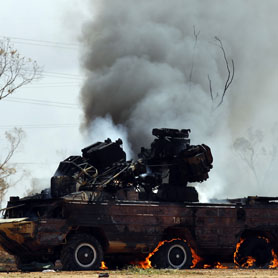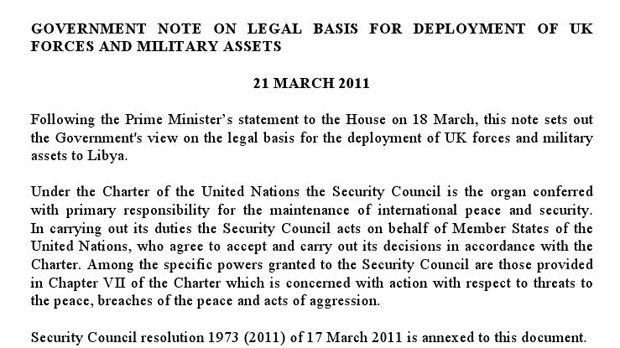Libya: Gaddafi’s air defences ‘knocked out’
Rebels in Benghazi have celebrated allied strikes against Gaddafi’s air defences, but as Lindsey Hilsum reports from the frontline there are still desperate calls for weapons and more support.
The international military alliance against Colonel Gaddafi has knocked out his air defences – but there are conflicting messages about whether the dictator and his regime will now be the target of air strikes.
David Cameron told the House of Commons two days of missile strikes from international forces, including a Royal Navy submarine and RAF aircraft, had resulted in “good progress”.
The Prime Minister said: “Coalition forces have largely neutralised Libyan air defences and as a result a no-fly zone has effectively been put in place over Libya.
Add your voice – LIVE BLOG: Libya attacks #c4news
“It is also clear that coalition forces have helped to avert what could have been a bloody massacre in Benghazi. In my view they did so just in the nick of time.”
President Barack Obama also defended the strikes on Monday: “US military action is in support of an international mandate – focusing on humanitarian threat. “Gaddafi was continuing to act aggressively so we decided to move forward… the plan that had been developed was put in place.”
However, President Obama went further than other international leaders before him and declared that “It is U.S. policy that Gaddafi needs to go.” Before now, leaders and UN delegates had made it clear they were staying clear of supporting regime change and that action was solely to halt action from Gaddafi’s forces against his own people.
‘More weapons needed’
The coalition forces, including UK, US and French military assets, took out air defences over two nights of bombardment. A building in Gaddafi’s compound was destroyed – despite insistences that Gaddafi was not a target.
Here they don’t really care about the specific wording of the UN resolution, all they care about is getting rid of Colonel Gaddafi. Lindsey Hilsum
In the rebel stronghold of Benghazi they’ve welcomed the airstrikes – as insurgents tried to launch a new offensive against pro-Gaddafi forces in the eastern town of Ajdabiya. Channel 4 news’ international editor Lindsey Hilsum, reporting on the road to Ajdabiya in Benghazi, says that although many rebels have reacted with joy and gratitude, they are calling for equipment and arms to help them topple Gaddafi.
“Here they don’t really care about the specific wording of the UN resolution, all they care about is getting rid of Colonel Gaddafi” she said.
“What they believe here is the only way to prevent civilian deaths is to get rid of Gaddafi. But in Washington, Paris, and London it is very different.
“There they’re haunted by two wars in Iraq, by George Bush Sr. who failed to go all the way in Iraq and many say that’s why Iraq endured 10 more years of dictatorship, and the uprising there was brutally put down. And of course there is the most recent war in Iraq that created chaos.”
“But here they don’t care about precedents, they just want Gaddafi to go”
Gaddafi
Mr Cameron acknowledged that questions would now be asked about the scope of foreign intervention in Libya, and whether the allies intend to topple Gaddafi.
He said: “In terms of what the UN Security Council resolution says, it’s very clear about the fact that we are able to take action, including military action, both to put in place a no-fly zone that prevents air attacks on Libyan people but also to take all necessary measures to stop the attacks on civilians.
“And we must be clear about what our role is – and our role is to enforce that UN Security Council resolution.
Read more from Channel 4 News on Libya: 'we are in this for the long haul'
“Many people will ask questions I’m sure today about regime change and Gaddafi and the rest of it.
“I’ve been clear; I think Libya needs to get rid of Gaddafi. But in the end we are responsible for trying to enforce this Security Council resolution. The Libyans must choose their own future.”

Britain has refused to rule out the possibility of targeting Gaddafi directly and his regime with its air strikes, but the US and France have flatly ruled out such a strategy.
The ambivalence surrounding what military action the 1973 resolution legitimises began when Foreign Secretary William Hague implied that although killing Gaddafi, who has ruled Libya for over four decades, is not an objective at present, future events could change that; the argument being that as head of Libya’s Armed Forces, Gaddafi is a justifiable target.
Mr Hague said: “The things that are allowed depend on how people behave. It depends on the circumstances. I’m not going to get drawn into the details of what or who might be targeted.”
Read more in our Libya Special Report
The refusal to disqualify the targeting of Gaddafi was later reinforced by Defence Secretary Liam Fox. “That would potentially be a possibility. You would have to take in account any civil casualties that would arise from that,” he said in an interview, before adding caution.
“We are very careful at all times to avoid that.”
Dr Fox later added: “There is a difference between someone being a legitimate target and whether we go ahead and target him. You would have to take into account what would happen to civilians in the area, what might happen in terms of collateral damage. We don’t simply with a gung-ho attitude start firing off missiles.”
He then added: “Regime change is not an objective, but it may come about as a result of what is happening amongst the people of Libya.”
But the US appeared to rebuff the possibility of killing Gaddafi in a strategic attack to ‘decapitate’ his regime.
Pentagon spokesman Vice-Admiral William Gortney said: “We are not going after Gaddafi. At this particular point I can guarantee he is not on the target list.”
The rejection was echoed by France. A French foreign office spokesperson said that the targeting of Gaddafi was not on its agenda. “Mr Juppe (Alain, France’s Foreign minister) has said the plan is to help Libyans choose their own political future, so no,” the spokesperson told Channel 4 News.
And perhaps the biggest refutation of Mr Hague and Dr Fox’s unwillingness to rule out the targeting of Gaddafi came from the head of UK Armed Forces, Gen Sir David Richards.
He said Gaddafi is “absolutely not” a target for military action. “It is not allowed under the UN resolution and it is not something I want to discuss any further,” he said.
Meanwhile, military action to enforce the UN resolution in Libya will continue while there is no evidence of a ceasefire by Colonel Muammar Gaddafi’s forces, the Ministry of Defence has said.
Major General John Lorimer, strategic communications officer to the Chief of the Defence Staff, said the Gaddafi remained in breach of Security Council charter.
“Although the Libyan authorities again claimed a ceasefire yesterday, there has been no evidence to suggest there has been any change in the stance of the Libyan military,” he said.
“As the Prime Minister has said, we will continue to judge Colonel Gaddafi on his actions, and our assessment is that he is in breach of these obligations so we will continue to enforce the resolution.”
At a press briefing at the MoD, Maj Gen Lorimer said the allies’ attacks had been “highly effective”.
Maj Gen Lorimer denied that the firing of British Tomahawk missiles had resulted in civilian casualties.
He said the missiles, launched from Trafalgar class submarines in the Mediterranean, had hit their intended targets in the Libyan military’s command and control system.
“These were launched and successfully attacked the intended targets,” he said.
“Despite Libyan reports and claims to the contrary, we are not aware of any civilian casualties.”

Government legal note on legality of Libya action – to read in full click here
Gaddafi building destroyed
A building in Muammar Gaddafi’s compound has been destroyed by an allied cruise missile in a second night of air strikes in Libya.
Half of the administration building at the site in Tripoli was knocked down, although US authorities insisted Gaddafi was not a target.
It came as a Royal Navy submarine joined US forces in targeting Gaddafi’s air defences, but a mission involving RAF Tornado jets had to be aborted to avoid civilian casualties.
Earlier, the Ministry of Defence (MoD) revealed a British Trafalgar-class sub stationed in the Mediterranean fired Tomahawk missiles at air defence targets in Libya as part of a co-ordinated action for the second night in succession.
About 300 Gaddafi supporters were in the compound at the time, but it is not known if any were hurt.
The onslaught continued despite a ceasefire announced by the Libyan authorities at 7pm, which was treated with suspicion in London and Washington. Earlier in the day, Gaddafi had threatened “a long war”, and his forces launched a fresh assault on rebels in Misrata.
RAF Typhoons are today in place in the southern Italian air base of Gioia del Colle, after deploying on Sunday from Coningsby in Lincolnshire to be within easy range of Libya.
Planes from Arab state Qatar, as well as Belgium, Denmark and Spain, have arrived to join Britain, France, Canada and the US in patrolling the no-fly zone established over Libya thanks to the destruction of Gaddafi’s air defences.
Gulf Cooperation Council Secretary-General Abdulrahman al-Attiyah confirmed UAE and Qatari involvement in what the Americans are calling Operation Odyssey Dawn and the UK Operation Ellamy.
He said: “We are within the coalition for safety and security according to the UN resolution.”
US Defence Secretary Robert Gates last night said he expected America to hand over command of the mission to a coalition – probably headed by the UK, France or Nato – within “a matter of days”.
Mr Gates told reporters that President Barack Obama felt strongly about limiting the US role in operations, adding: “We will continue to support the coalition, we will be a member of the coalition, we will have a military role in the coalition, but we will not have the pre-eminent role.”
-
Latest news
-
As India goes to the polls in the world’s largest election – what do British-Indians think?6m

-
Tees Valley: Meet the candidates in one of the biggest contests coming up in May’s local elections4m

-
Keir Starmer says public sector reform will be a struggle7m

-
Nicola Sturgeon’s husband Peter Murrell charged with embezzlement of funds from SNP1m

-
Ukraine might finally get $60billion in American weapons and assistance to defend against Russia3m

-




